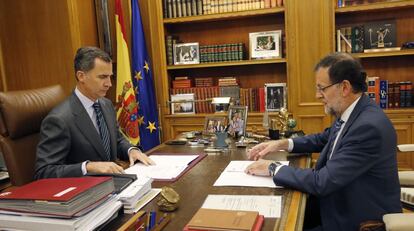Rajoy resigns himself to defeat in first round of voting in Congress
PP sources fear investiture debate will highlight the isolation of prime ministerial candidate

Acting Prime Minister Mariano Rajoy is resigned to the fact that he will lose the first bid to get himself reinstated, but is ready to go through the motions anyway.
The investiture session will likely be held in late January or early February, over a month after an inconclusive general election that yielded a hung parliament.
Rajoy, whose Popular Party (PP) won the most seats at the election (123), has been seeking to forge an unprecedented grand alliance with his traditional rivals, the Socialists (90), in order to form a stable government for the next four years. The emerging center-right party Ciudadanos (40) has also been asked to join.
But Socialist Party (PSOE) leader Pedro Sánchez refuses to enter into such a partnership, and is instead working on an alternative alliance with the anti-austerity group Podemos and regional parties that support greater self-rule in places such as Catalonia and the Basque Country.
“If you don’t show up at Congress, you might as well go home” - Pedro Sánchez to Mariano Rajoy
In the meantime, Sánchez is urging Rajoy to try his luck at the first investiture session, in full knowledge that the conservative leader will fail and that Congress will be forced to hold a run-off vote.
“You cannot give up on presenting your candidacy for the investiture,” said Sánchez to Rajoy. “If you don’t show up at Congress, you might as well go home.”
While nobody in PP circles will come out and say it, there are widespread fears that Rajoy’s doomed investiture bid will only serve to underscore the candidate’s isolation, and possibly boost his Socialist rival’s own image.
But Rajoy himself is determined to look anything but resigned. On Thursday, he made it clear that he wishes to be there at the first vote to defend his plans for Spain as the representative of the most-voted party.
The “natural order of things”
There is someone else who wants him to be there as well. King Felipe VI, who has been meeting with political leaders as part of the pre-investiture protocol, wants “the natural order of things” to be respected, according to Compromís spokesman Joan Baldoví, who met with the monarch on Thursday.
While the Spanish Constitution establishes a merely symbolic role for the king at these meetings, the fragmented scenario that emerged from the December 20 election, with no clear candidate to the prime minister’s office – an unprecedented situation in Spanish democratic history – means that he could play a bigger role as a mediator.
Support at what price?
But regional Socialist leaders are wary of the deals that Sánchez may be making with other parties, and have asked for the party’s federal committee to greenlight them first.
Podemos has long defended Catalonia’s right to a legal referendum on self-rule, an issue that puts it at odds with the Socialist Party. Meanwhile, the Basque Nationalist Party (PNV) is ready to support Sánchez, but only in exchange for a new relationship with the central government that includes the right to decide on the region’s future.
English version by Susana Urra.
Tu suscripción se está usando en otro dispositivo
¿Quieres añadir otro usuario a tu suscripción?
Si continúas leyendo en este dispositivo, no se podrá leer en el otro.
FlechaTu suscripción se está usando en otro dispositivo y solo puedes acceder a EL PAÍS desde un dispositivo a la vez.
Si quieres compartir tu cuenta, cambia tu suscripción a la modalidad Premium, así podrás añadir otro usuario. Cada uno accederá con su propia cuenta de email, lo que os permitirá personalizar vuestra experiencia en EL PAÍS.
¿Tienes una suscripción de empresa? Accede aquí para contratar más cuentas.
En el caso de no saber quién está usando tu cuenta, te recomendamos cambiar tu contraseña aquí.
Si decides continuar compartiendo tu cuenta, este mensaje se mostrará en tu dispositivo y en el de la otra persona que está usando tu cuenta de forma indefinida, afectando a tu experiencia de lectura. Puedes consultar aquí los términos y condiciones de la suscripción digital.









































